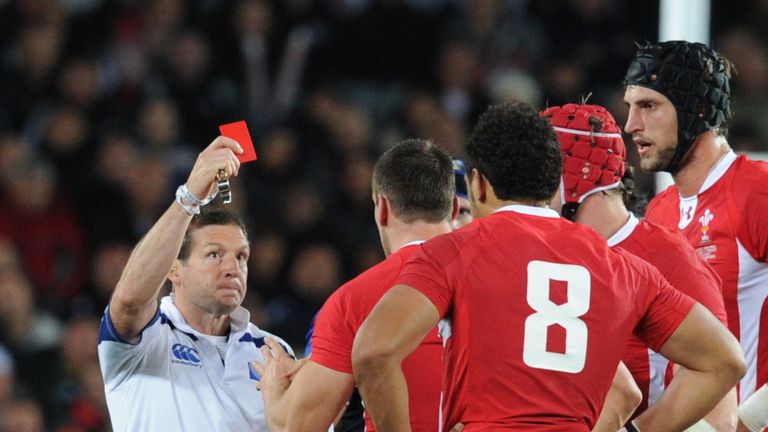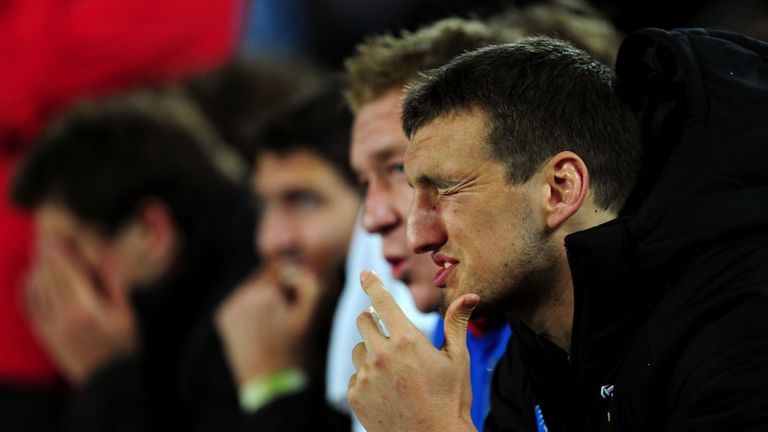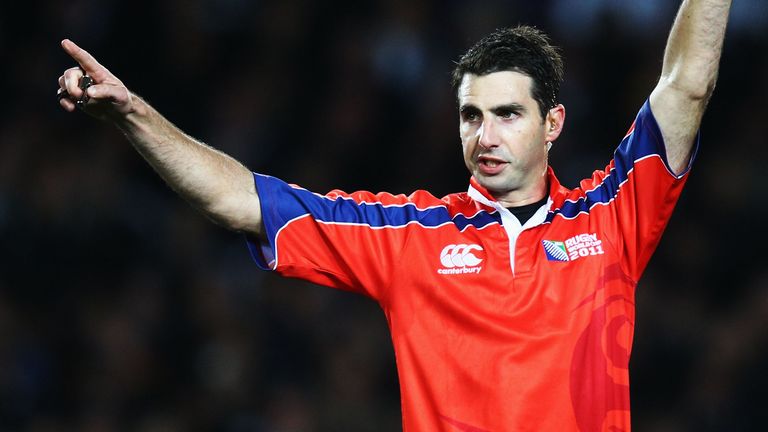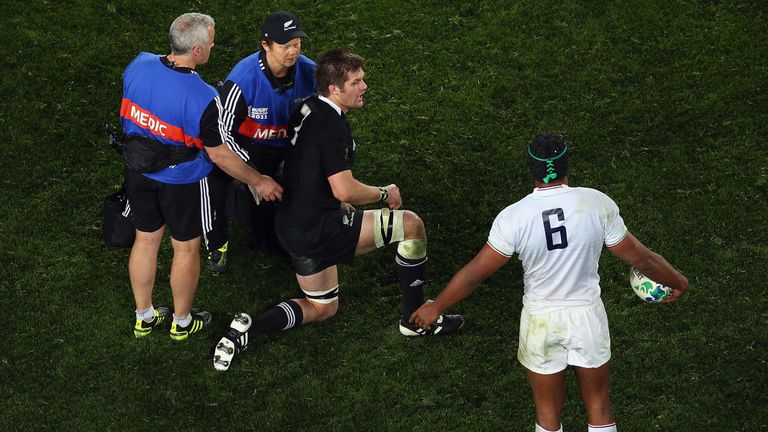Rugby World Cup: Five controversial moments on rugby's greatest stage
The 2019 Rugby World Cup kicks off on Friday September 20, and runs until the final on Saturday November 2

Wednesday 18 September 2019 16:27, UK
On Monday we looked at some of the Rugby World Cup's most memorable moments. Below, we look at five of the most controversial events in the tournament's history...
Warburton sees red
Back in 2011, Warren Gatland's Wales were contesting their second Rugby World Cup semi-final and first since 1987 when they met France in New Zealand.
Wales had already knocked out Ireland in the quarters - the Irish had beaten Australia and looked in great nick - while France had lost to Tonga in the pool stages.
Wales were hot favourites to make a first World Cup final, but, just 18 minutes into the semi-final, skipper Sam Warburton - one of the players of the tournament - was shown a hugely controversial straight red card.
The flanker smashed France wing Vincent Clerc in a tackle, lifting him above the horizontal, twisting him and then crashing him back down to the turf.
It was most certainly illegal, but with Clerc appearing to land more on his back than his shoulders and head, a yellow card would perhaps have sufficed.
Referee Alain Rolland had no hesitation in pulling out the red card to the shock of all watching, and in the most significant Wales rugby Test for nearly 25 years, they were reduced to a man less for over an hour.
They battled superbly, regardless, losing by just a point 9-8, but that semi-final will always be a case of one that got away for Wales.
Even by today's standards, it looks an extremely harsh call.
A poisoning in 1995?
In 1995, South Africa were taking part in their maiden Rugby World Cup as hosts, having missed the first two editions as a result of the international sports boycott due to apartheid.
At the tournament, New Zealand, boosted by the emergence of the late, rampaging Jonah Lomu, had looked in phenomenal shape, plundering past Ireland, Wales, Scotland and England en route to the final.
The big wing had scored seven tries, memorably notching four in a 45-29 semi-final win over England, with the All Blacks then to meet the Springboks in the final in Johannesburg.
Yet, in that final, New Zealand emerged playing considerably off the pace they had previously set. Indeed, they had scored some 41 tries in five games before the final. Facing the Springboks, they failed to score one.
South Africa ultimately won courtesy of a Joel Stransky drop-goal in extra-time, but stories emerged afterwards that a large proportion of the All Blacks squad had been violently ill in the days leading up to the final.
Rumours have persisted over the ensuing three decades that the squad were poisoned in South Africa before the game, with stories of projectile vomiting, food poisoning, contaminated drinking water and even a mystery waitress suspected called 'Suzie'.
All Blacks head coach Laurie Mains even hired a private investigator after the final, while he and a former bodyguard to Nelson Mandela, Rory Steyn, believe betting syndicates may have been behind a plot to poison the squad, although nothing has ever been proved.
Either way, it is one of the most controversial episodes in rugby history, and one which has never really been properly explained.
Questionable refereeing sees All Blacks triumph
If the All Blacks and Kiwi fans still harbour complaints over that 1995 final - and they do - they were more than repaid in the 2011 final against France.
Having not won a World Cup since the first one in 1987, despite having been the best performing nation for large periods of the subsequent 24 years, New Zealand were under huge pressure as hosts of the 2011 Rugby World Cup.
When the side had booked a place in the final and were due to face France at Eden Park - who they had already dispatched 37-17 in the pool stages, and who had lost to Tonga and only beaten Wales by a point in their semi despite playing against 14 for over an hour - confidence and expectation was massive.
But, on the balance of the final, France should have become world champions for the first time. Indeed, they likely would have done so but for a questionable refereeing performance from Craig Joubert.
The final finished 8-7 to New Zealand - the lowest scoring and tightest in history. But as New Zealand's nerves saw them tighten up in the final stages and play negatively, France should have been afforded the chance to kick winning penalties for persistent All Black breakdown infringements.
The illegality of the All Blacks at the ruck, in terms of offside, playing the ball off feet and side entry was rife, but Joubert refused to punish the likes of Richie McCaw and Jerome Kaino.
One particular incident on the New Zealand 10-metre line, with four minutes of the final left, saw Kaino play the ball off his feet, drop it forward onto the ground, and both Andrew Hore and McCaw play the ball offside. Joubert's response? To shout: 'play on'.
"Kaino committed a lot of fouls, McCaw doing what he wanted and they were not penalised. Unless the fault was really rough, they were not punished," France hooker Dimitri Szarzewski said. "Mr Joubert was not brave. It was a World Cup final. I wanted things to be fair. And that was not the case."
Joubert's performance was described by some members of the rugby media in the aftermath as "shameful and disgraceful", "ignoring offside play and breakdown indiscretions that should have cost the home team penalties", "not refereed evenly" and "disgraceful for a game of this magnitude".
A controversial affair for sure.
A referee 'throttled' in 1991
At the 1991 Rugby World Cup, France faced England in the quarter-finals at the Parc des Princes in Paris, with a decade of bad blood on the line.
Les Bleus clinched Five Nations titles in 1981, 1983, 1986, 1987, 1988 and 1989, but England had beaten France for the first time in seven years in 1989, before thrashing them away in 1990 and winning a Grand Slam of their own in 1991.
Each occasion the sides faced, physical violence was to the fore, and the World Cup clash was no different. Nigel Heslop and Will Carling smashed into Serge Blanco despite the France full-back having taken marks, with Heslop receiving a punch to the face in response.
The packs were gruesome, with players being stamped upon all around the place. England ground their way to a 19-10 success.
"That defeat was the biggest disappointment of my career," Blanco said after. "Not because of losing but because of the way it happened. The ref that day turned a blind eye to English foul play. He was incoherent. I was trampled, kicked and had my head walked on."
France coach Daniel Dubroca sought referee David Bishop after the Test, grabbing him by the throat, spitting at him and repeatedly calling him a cheat in an out-of-control rage. French prop Pascal Ondart is also alleged to have thrown a punch at the referee.
The wider response was of horror, with Dubroca ultimately resigning. Referee Bishop quipped after that Dubroca had "shaken me warmly by the throat". An ugly day all round.
Scots robbed of World Cup semi
Four years ago, controversy did not escape the World Cup either, with Vern Cotter's Scotland extremely unfortunate not to have booked a semi-final place - in fact, even World Rugby confirmed as much in the aftermath.
Facing Australia at Twickenham in their quarter-final, tries from Pete Horne, Tommy Seymour and Mark Bennett sensationally had the Scots leading the Wallabies 34-32 into the very final stages against all expectations.
In lashing rain, Scotland overthrew a lineout by their own 22 with two minutes left, and the bouncing ball was chased by players from both nations.
Scotland's John Hardie spilled the ball, which then hit the shoulder of fellow back-row Josh Strauss to shoot forward where replacement Jon Welsh caught it. The decision by referee Joubert (the same referee as 2011) was to give a penalty for offside.
But, what Joubert had missed was that Australia's Nick Phipps had slapped the ball back at almost the same moment it had hit Strauss, meaning the decision should have been a scrum to Australia and not a penalty.
By the time Bernard Foley had struck the ball through the posts off the tee for a one-point Australia lead, there was just 40 seconds left.
Joubert, perhaps realising he had made an error, then chose to run off the pitch at the final whistle instead of shaking hands - something which produced boos in the stadium and outcry among rugby pundits and players in the aftermath.
So much so, World Rugby took the decision to unusually and very publicly confirm Joubert had acted in error:
"The selection committee confirms that Joubert applied World Rugby Law 11.7 penalising Scotland's Jon Welsh, who had played the ball following a knock-on by a team-mate, resulting in an offside," World Rugby said in a statement.
"On review of all available angles, it is clear that after the knock-on, the ball was touched by Australia's Nick Phipps and Law 11.3(c) states that a player can be put onside by an opponent who intentionally plays the ball.
"In this case, Law 11.3(c) should have been applied, putting Welsh onside. The appropriate decision, therefore, should have been a scrum to Australia for the original knock-on."
















